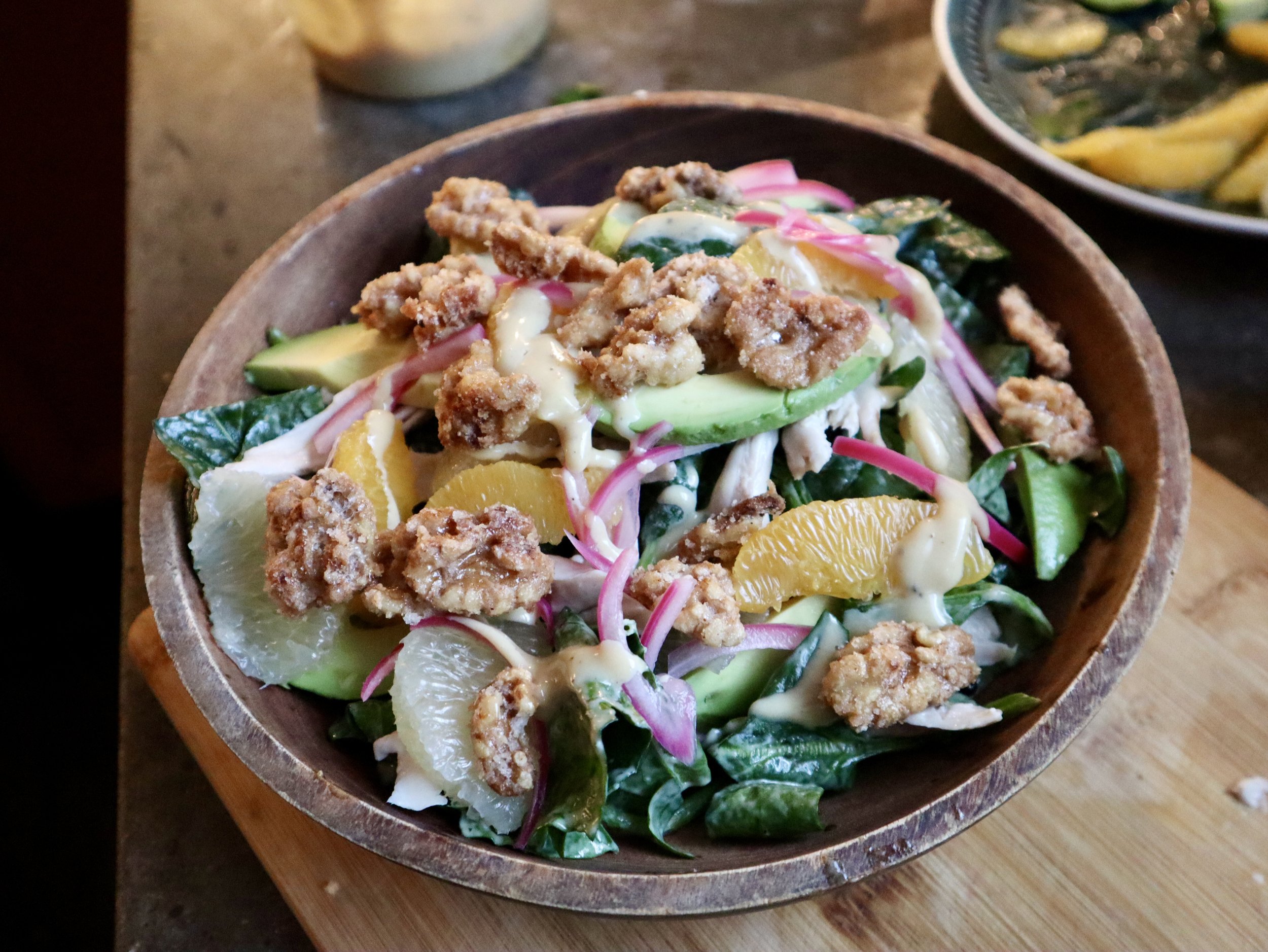The Winter Table
story by Donna Hecker
It’s bone-chillingly cold outside. The ground is still covered with a layer of ice and several inches of snow; another winter storm is on the way. Freezing fog hangs in the air, nearly obscuring the backyard garden and the skeleton of a greenhouse traced in white.
And yet, peek under the bedding draped over the low hoops straddling the lettuce rows, itself blanketed in snow, and there they are – rosettes of jade green spinach and chartreuse lettuce. Nearby is buried treasure – tiny super-sweet carrots ready to be unearthed as soon as the frozen ground relents.
Winter food isn’t like summer food — the bursting tomatoes, milky corn, snapping fresh beans and peppers full of crunch. Winter food is sturdy and earthy and often in need of peeling and cutting down to size. It’s kale and spinach, beets and turnips, carrots and potatoes. Winter food is there for the long haul; it requires sober and strategic planning.
But there are bright spots in winter, too. It’s the season of citrus in all sizes and colors and flavors. It’s peak time for Florida strawberries and California kiwi and Mexican avocado. And there’s a special kind of pleasure to be had when we reach for these exotics (for that’s what they once were) to spark a salad, or bowl of soup or morning oats.
If you’re splurging on any of these, consider buying organic – strawberries, for instance, are #1 on the Dirty Dozen list of fruits or vegetables most likely to be contaminated by pesticides. Also in the produce section, you might find Meyer lemons at the moment. They’re a cross between a citron and a mandarin/pomelo variety, and are sweet enough to eat out of hand, skin and all — another reason to choose organic.
For those of us who miss summer mornings at the farmers market, and who aspire to eat local year round, there’s a surprising quantity and variety of food available in Central Kentucky during the winter months. Spinach, arugula, cabbage, herbs and green onions. Carrots, potatoes, hard squashes and hardy apples. And an ever-growing supply of mushrooms.
Mushrooms are a great wintertime food; they can be put to delicious use in lots of hearty, cold-weather dishes like stews, soups and pastas. Keith Duncan of Duncan’s Narrow Gate Farm in nearby Scott County supplies a variety of mushrooms to our Holly Hill restaurants; other local growers include Mountain House (Estill County), Sylvatica (Rockcastle County) and Ashbourne (Oldham County.)
Unlike mushroom growers, who often have the advantage of indoor cultivation, many of our farmer friends have to contend with high tunnels that collapse under snow, temperatures too cold to harvest, or ground too frozen to dig. Which prompts us to exercise patience and express profound gratitude for their labor and the fruits thereof.
As weather patterns change and seasons shift, we’re likely to see more small- and large-scale farmers turning to regenerative practices, high tunnels, technology-informed agriculture, and hydroponics. Local strawberries are showing up at the grocery now, grown by Bosch Berries in Somerset at a former AppHarvest facility, and packed under the Sunset label. Bosch Berries is a division of Bosch Growers, a sixth-generation family business based in The Netherlands, and a pioneer of high-tech greenhouse cultivation.
So continue to seek out local fruits and vegetables (and meats, too!) wherever you can – farmers markets are still open in many places, and more and more groceries are stocking locally grown foods. It’s okay to dream of April asparagus and May peas and June berries, but let’s appreciate what’s on our plate now and imagine how much sweeter spring will taste when it arrives.
And in the meantime, follow along with us on our brand-new Holly Hill Gardens Instagram, for weekly observations from David Wagoner, who tends our growing gardens.
Related Content
Winter Woodford Salad
This salad is sunshine on a plate; it’s the perfect complement to cold weather stews and roasts, and easily shape shifts through the seasons according to what’s on the grocery shelf or farmers market table.
© 2025, Holly Hill Inn/Ilex Summit, LLC and its affiliates, All Rights Reserved



